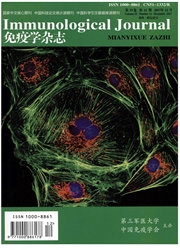

 中文摘要:
中文摘要:
树突状细胞(dendritic cells,DCs)做为体内功能最强的专职抗原提呈细胞,自从被发现以来,其功能受到了研究者们广大的关注。调节外周骨髓来源DCs通过输入淋巴管迁移至淋巴结发动初始免疫应答的机制至今仍不是十分清楚,但是利用基因打靶等技术已经表明趋化因子受体CCR7(CC chemokine receptor7)是DCs从外周迁移至淋巴系统发挥作用的最重要的启动和调节者。除此之外,现有研究发现CCR7在DCs细胞上尚可发挥趋化功能以外的多种多样的功能,本文就DCs上CCR7的功能研究现状做一综述。
 英文摘要:
英文摘要:
Dendritic cells (DCs) are the most potential professional antigen presenting cells in vivo. Since been found in 1973, DCs have attracted much interest of researchers. Via the afferent lymphatics, peripheral myeloid DCs can migrate to lymph nodes, where they play an important role in the initiation of the immune response. However, the mechanism which regulates the migration remains undefined. The use of gene targeting technology has made it clear that chemokine receptor CCR7( CC chemokine receptor 7 ) plays a key role in launching and regulating the migration of DCs from peripheral to the lymphatic system. Recently, a variety of reports have indicated that, apart from chemotaxis, CCR7 controls the cytoarchitecture, endocytosis, the survival, the migratory speed, and the maturation of the DCs. This article reviews the recent advances in the function of CCR7 on DCs.
 同期刊论文项目
同期刊论文项目
 同项目期刊论文
同项目期刊论文
 期刊信息
期刊信息
